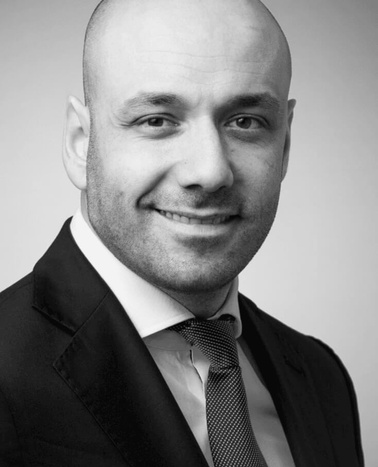
Giulio Palermo
Giulio Palermo was born and raised in Italy, where he completed his academic studies. After a serious accident prevented him from his planned travels, he found his first job at a law firm in Rome, where he fell in love with litigation. Even so, he was set on living and working abroad, so he decided to move into international arbitration.
Having previously studied an LL.M. in International Legal Practice at IE Law School. Giulio will now be teaching a course on sport arbitration at the Master in Laws (LL.M.). With this course he aims to give students a detailed understanding of working in this field, and he hopes to inspire students to pursue careers in arbitration.

"The most important skill to succeed is passion about the job itself."
What were your initial plans in law?
When I started studying law, I was quite sure that I wouldn’t end up as a lawyer. My main goal at the time was to live and work in as many countries as possible. I was therefore planning to work for an international organization.
Why did you decide to specialize in international arbitration? Have you always had clarity regarding the career path you took?
After I finished law school, I decided to take a year off to travel. One day before my departure, I had an accident, and was forced to stay in hospital for a month. Therefore, I started sending my CV around and found my first job at a law firm in Rome. After one week of working there, I realized that I loved being a litigator, and that studying and practicing law are two completely different things. However, working as a litigator was incompatible with my ambition to live and work abroad.
I soon discovered that the area of international arbitration would give me exactly what I was looking for, i.e. arguing cases while traveling the world. I was told that it was a very difficult industry to get into, but I was ambitious enough to go for it. Moreover, I didn’t have much to lose, since my father, mother and grandparents were all surgeons, and were already disappointed that I did not take over their practice.
You have a comparative and international outlook (practicing law in different jurisdictions). In today’s world, how important is studying law through a comparative approach?
I find this approach essential as, most of the time, the underlying dispute in arbitration relates to facts that took place in at least two jurisdictions/countries. Therefore, in order to effectively understand the parties’ positions, it is necessary to understand their current perception of their respective case/obligations.
The future of arbitration is very bright, despite the uncertainty of the current times. Arbitration seems to be increasingly the best way to settle disputes related to the globalized economy.
What do you find most satisfying about your profession?
Resolving my clients’ problems, finding simple solutions to complex issues and working with passionate people as a team.
You will be a professor next year! Could you tell us what you expect from teaching at IE Law School? What will you teach?
I will be teaching a course on sport arbitration, as a part of the arbitration module taught by Marco De Benito. The main goal of the course is to educate students on the most practical and niche aspects of the subject, in order for them to understand what it really feels like to work in such a field. In terms of my expectations, I would be very satisfied if the course inspired at least one of the students to pursue a career in this field.
Did your time at IE University as a student help equip you to stand out in your profession today?
The 2009/2010 Master in International Legal Practice was an extremely practical course for junior lawyers wishing to understand how to work in an international business law firm. The course was more focused on corporate law rather than dispute resolution (which is my field of expertise). I found it extremely useful because, firstly, it equipped me with a genuine knowledge of corporate matters that I have often applied since in the field of dispute resolution, and, secondly, because the professor of the course in international arbitration (the only dispute resolution-related module) offered me the opportunity to join his firm after graduation.
What would you recommend to students who want to specialize in arbitration?
I would principally suggest them to work on their drafting skills, especially in English. Also, they should be patient, because a career in arbitration is a marathon. However, the hard work and integrity pays off at the end of the road. It is important, moreover, not to be concerned about how prestigious their first place of work is, but to make sure to work with someone who will give them the opportunity to grow, to become an excellent professional and to be visible in the industry when the right moment comes. The industry is very competitive today and, in the long term, the most important thing is the quality of the work and its publication.
What does the future of arbitration look like? How is technology and globalization affecting the practice of arbitration and what skills will be necessary to succeed?
I think it is very bright, despite the uncertainty of the current times. The arbitration industry was able to adapt immediately to, and cope with, the unforeseen circumstances caused by the pandemic. The vast majority of arbitration hearings, client meetings, seminars, conferences etc. were not canceled, but just migrated online. I know of very few arbitration cases that were delayed because of the pandemic, whereas the vast majority of proceedings before national courts suffered, and are still suffering, substantial delays. Given the arbitration community’s capacity to adapt to these circumstances, and the corporate and multicultural background of its practitioners, arbitration seems to be increasingly the best way to settle disputes related to the globalized economy. This means that having great IT skills and the capacity to work in different languages are necessary skills to succeed. However, I think that the most important skill is still passion about the job itself.
What activities do you enjoy the most?
Spending time with family and friends, underwater fishing and reading.
TAKE THE NEXT STEP IN YOUR LEGAL EDUCATION
TAKE THE NEXT STEP IN YOUR LEGAL EDUCATION